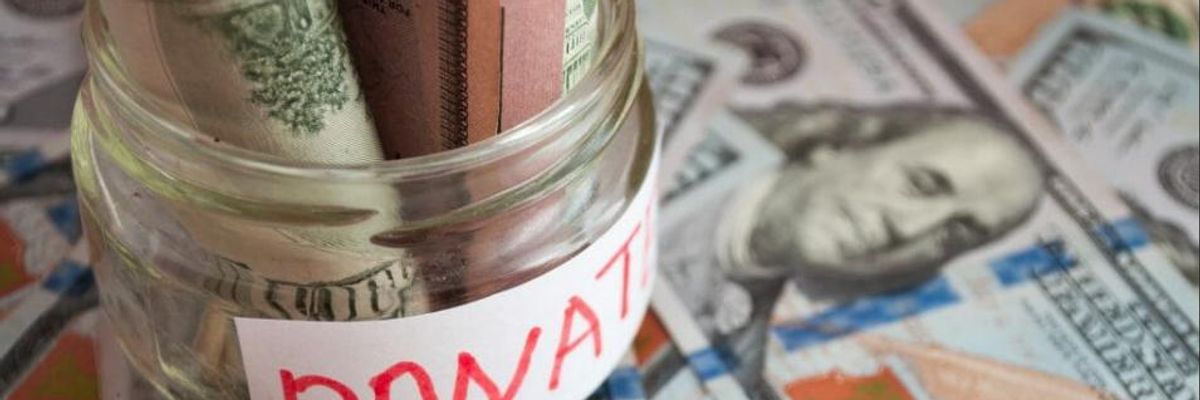We are living through a time of unprecedented challenges: a major public health crisis and a deepening recession.
Congress has already authorized trillions in stimulus funds. But millions of Americans are still relying on the support of local nonprofits such as food banks and human services. These nonprofits are going to need major infusions of support from charitable donations and foundations.
Fortunately, Congress can help them come up with $200 billion--without costing taxpayers another dime.
Lawmakers should institute an emergency temporary three-year mandate to increase payout from private foundations and donor-advised funds. This policy change would stimulate over $200 billion over three years in additional giving to direct charities in the independent nonprofit sector. This stimulus would require no new tax dollars, as it has already been "paid for" by previous tax deductions taken primarily by wealthy donors.
We have heard many heartening stories of charitable foundations and individual donors stepping up to fund emergency responses to the COVID-19 pandemic. But this moment has also unmasked a basic design flaw in the U.S. charity system: donors can contribute to charitable intermediaries that then may sideline the funds for years--or forever.
Right now, there is an estimated $1.2 trillion in wealth warehoused in private foundations and donor-advised funds. While the donors to these funds have already taken substantial tax breaks for their contributions--sometimes decades ago--there are few incentives to move the money out to charities doing urgent, necessary work.
In fact, America's 728,000 donor-advised funds, or DAFs--which hold an estimated $120 billion--aren't legally required to pay out their funds at all, ever. While some DAFs, especially those administered by community foundations, pay out in a timely way, other accounts can languish for years.
America's 86,000 foundations which hold over $1 trillion in assets are mandated by tax law to pay out 5 percent of their assets each year. But this payout calculation includes foundation overhead expenses, donations to donor-advised funds (which, again, have no payout requirement), and even investments in profit-making companies that the donor claims make a positive impact on society.
Some foundations pay out substantially more than 10 percent, including the Walton Family Foundation, the Simons Foundation, and the Bill and Melinda Gates Foundation. But many more treat the 5 percent minimum payout as a ceiling, not a floor--and some fall below the floor. The John Templeton Foundation, for example, with $3.2 billion in assets in 2018, had a payout rate of just 4.2 percent that year.
Remember: the deductibility of these funds is subsidized by ordinary taxpayers. For the wealthiest donors, every dollar parked in their foundation or DAF reduces their tax obligations by as much as 74 cents, leaving people of more modest means to cover public programs.
These wealthy donors have already claimed their tax breaks. Now--in a crisis--ordinary taxpayers need to see the benefit of the funds they subsidized flowing to charities on the ground.
Over 700 foundations have signed a pledge to "act with fierce urgency" to support nonprofit partners and communities hit hardest by COVID-19. And the community foundation sector has set up emergency response systems in all 50 states to channel donations to COVID-19 response efforts.
These are inspiring voluntary efforts, but it's not clear how many funds frontline nonprofit organizations will actually receive as a result. In this unprecedented emergency, it's time to mandate an increased flow of funds.
As part of the CARES Act stimulus, Congress increased incentives for charitable giving. In the same spirit, we urge Congress, as part of its next relief bill, to support an "Emergency Charity Stimulus" to inject more than $200 billion into the economy, protect jobs in the nonprofit sector, and help fight the coronavirus disaster.
The proposed three-year emergency mandate would require private foundations to double their annual required payout, from 5 percent to 10 percent. For each one percent increase in payout, an estimated $11 billion to 12.6 billion will flow to charities annually. We propose that a payout requirement apply to DAFs accounts as well, which currently have no mandatory payout.
America's taxpayers have already effectively paid for these funds through deductions taken by foundation and DAF donors. Now we need them deployed to working charities.

